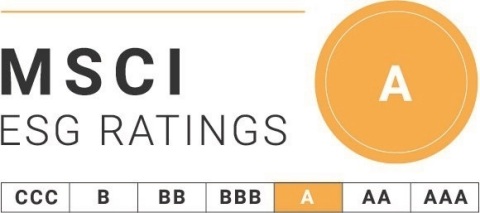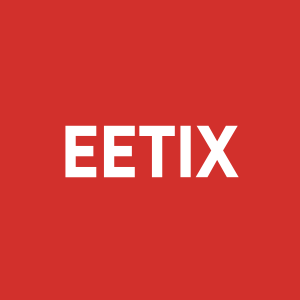Ecofin Expands Climate Action Offerings With Launch of Ecofin Global Energy Transition Fund (EETIX)

Represents the aggregate ranking of the Fund’s holdings as of 10/15/2021. Certain information ©2021
EETIX invests in companies that are exposed to structural growth opportunities related to the energy transition associated with decarbonization. The fund brings to launch a strong performance track record of more than two years,1 has an A MSCI ESG rating (as of
The fund’s portfolio will invest in companies that derive at least
“The companies in our investment universe are advancing solutions which we believe positively contribute to the energy transition and are well aligned with global climate mitigation goals. Our investment team’s longstanding sustainable investing experience, coupled with proprietary viewpoints on climate change and decarbonization policy framework and laws, seek to drive alpha for our investors,” said
Performance data quoted represents past performance; past performance does not guarantee future results. The investment return and principal value of an investment will fluctuate so that an investor’s shares, when redeemed, may be worth more or less than their original cost. Current performance of the fund may be lower or higher than the performance quoted. Performance data current to the most recent month end may be obtained by calling 855-822-3863.
Senior Portfolio Manager
“The impact of addressing sustainable issues, such as climate change, has become a compelling investment case and, just as important, not factoring these issues represents an investment risk. We are thrilled to offer U.S. investors open-end funds focused on climate action as we believe investors are materially underweight in their sustainable allocations,” said
To learn more about EETIX and key reasons to invest, click here for a short video or visit ecofininvest.com/eetix.
About Ecofin
Ecofin is a sustainable investment firm dedicated to uniting ecology and finance. Our mission is to generate strong risk-adjusted returns while optimizing investors’ impact on society. We are socially-minded, ESG-attentive investors, harnessing years of expertise investing in sustainable infrastructure, energy transition, clean water & environment and social impact. Our strategies are accessible through a variety of investment solutions and seek to achieve positive impacts that align with UN Sustainable Development Goals by addressing pressing global issues surrounding climate action, clean energy, water, education, healthcare and sustainable communities.
1
2The MSCI ACWI Index captures large and mid cap representation across 23 Developed Markets and 27 Emerging Markets countries. The index covers approximately
Before investing in the fund, investors should consider their investment goals, time horizons and risk tolerance. The fund’s investment objective, risks, charges and expenses must be considered carefully before investing. The summary and statutory prospectus contains this and other important information about the fund and may be obtained by calling 855-822-3863 or visiting www.ecofininvest.com. Read it carefully before investing.
Investing involves risks. Principal loss is possible. The fund is non-diversified, meaning it may concentrate its assets in fewer individual holdings than a diversified fund. Therefore, the fund is more exposed to individual stock volatility than a diversified fund. Investing in specific sectors such as energy infrastructure and renewable energy infrastructure may involve greater risk and volatility than less concentrated investments. If for any taxable year the Fund fails to qualify as a RIC, the Fund’s taxable income will be subject to federal income tax at regular corporate rates. The resulting increase to the Fund’s expenses will reduce its performance and its income available for distribution to shareholders. Investments in foreign companies involve risk not ordinarily associated with investments in securities and instruments of
The fund applies ESG criteria to the investment process and may exclude securities of certain issuers for non-investment reasons and therefore the Fund may forgo some market opportunities available to funds that do not use ESG criteria.
Alpha is a measurement of excess return relative to the return of a benchmark. Beta is a measure of a stock's volatility in relation to the overall market. Volatility is the annualized standard deviation of the monthly NAV returns since inception. Standard deviation is a measure of the dispersion of a set of data from its mean. The more spread apart the data, the higher the deviation. Standard deviation is calculated as the square root of variance and is used by investors as a gauge for the amount of expected volatility. Sharpe ratio measures risk-adjusted performance. It is calculated by subtracting the risk-free rate from the rate of return for a portfolio and dividing the result by the standard deviation of the portfolio returns.
The MSCI ESG rating represents the aggregate ranking of the Fund’s holdings as of 10/15/2021. Certain information ©2021
MSCI ESG Research LLC’s (“MSCI ESG”) Fund Metrics and Ratings (the “Information”) provide environmental, social and governance data with respect to underlying securities within more than 31,000 multi-asset class Mutual Funds and ETFs globally. MSCI ESG is a Registered Investment Adviser under the Investment Advisers Act of 1940. MSCI ESG materials have not been submitted to, nor received approval from, the US SEC or any other regulatory body. None of the Information constitutes an offer to buy or sell, or a promotion or recommendation of, any security, financial instrument or product or trading strategy, nor should it be taken as an indication or guarantee of any future performance, analysis, forecast or prediction. None of the Information can be used to determine which securities to buy or sell or when to buy or sell them. The Information is provided “as is” and the user of the Information assumes the entire risk of any use it may make or permit to be made of the Information. The MSCI ESG Fund Ratings is designed to assess the resilience of a fund’s aggregate holdings to long term ESG risks. Highly rated funds consist of issuers with leading or improving management of key ESG risks.
-
AAA , AA: Leader- The companies that the fund invests in tend to show strong and/or improving management of financially relevant environmental, social and governance issues. These companies may be more resilient to disruptions arising from ESG events. - A, BB, BB: Average- The fund invests in companies that tend to show average management of ESG issues, or in a mix of companies with both above-average and below-average ESG risk management.
- B, CCC: Laggard- The fund is exposed to companies that do not demonstrate adequate management of the ESG risks that they face or show worsening management of these issues. These companies may be more vulnerable to disruptions arising from ESG events.
The Fund ESG Rating is calculated as a direct mapping of “Fund ESG Quality Score” to letter rating categories.
-
8.6- 10:
AAA - 7.1- 8.6: AA
- 5.7- 7.1: A
- 4.3- 5.7: BBB
- 2.9- 4.3: BB
- 1.4- 2.9: B
- 0.0- 1.4: CCC
The “Fund ESG Quality Score” assesses the resilience of a fund’s aggregate holdings to long term ESG risks. Highly rated funds consist of issuers with leading or improving management of key ESG risks, based on a granular breakdown of each issuer’s business: its core product or business segments, the locations of its assets or revenues, and other relevant measures such as outsourced production. The “Fund ESG Quality Score” is provided on a 0-10 score, with 0 and 10 being the respective lowest and highest possible fund scores.
The “Fund ESG Quality Score” is assessed using the underlying holding’s “Overall ESG Scores”, “Overall ESG Ratings”, and “Overall ESG Rating Trends”. It is calculated in a series of 3 steps.
Step 1: Calculate the “Fund Weighted Average ESG Score” of the underlying holding’s “Overall ESG Scores”. The Overall ESG Scores represent either the ESG Ratings Final Industry-Adjusted Score or Government Adjusted ESG Score of the issuer. Methodology for the issuer level scores are available in the MSCI ESG Ratings Methodology document.
Step 2: Calculate adjustment % based on fund exposure to “Fund ESG Laggards (%)”, “Fund ESG Trend Negative (%)”, and “Fund ESG Trend Positive (%)”.
Step 3: Multiply the “Fund Weighted Average ESG Score” by (1 + Adjustment %).
For more information please visit https://www.msci.com/esg-fund-ratings.
Safe harbor statement
This press release shall not constitute an offer to sell or a solicitation to buy, nor shall there be any sale of these securities in any state or jurisdiction in which such offer or solicitation or sale would be unlawful prior to registration or qualification under the laws of such state or jurisdiction.
Cautionary Statement Regarding Forward-Looking Statements
This press release contains certain statements that may include “forward-looking statements” within the meaning of Section 27A of the Securities Act of 1933 and Section 21E of the Securities Exchange Act of 1934. All statements, other than statements of historical fact, included herein are "forward-looking statements." Although the fund and its adviser and sub-adviser believe that the expectations reflected in these forward-looking statements are reasonable, they do involve assumptions, risks and uncertainties, and these expectations may prove to be incorrect. Actual results could differ materially from those anticipated in these forward-looking statements as a result of a variety of factors, including those discussed in the fund’s reports that are filed with the
View source version on businesswire.com: https://www.businesswire.com/news/home/20211019005408/en/
(913) 981-1020
info@tortoiseecofin.com
Source: Ecofin







